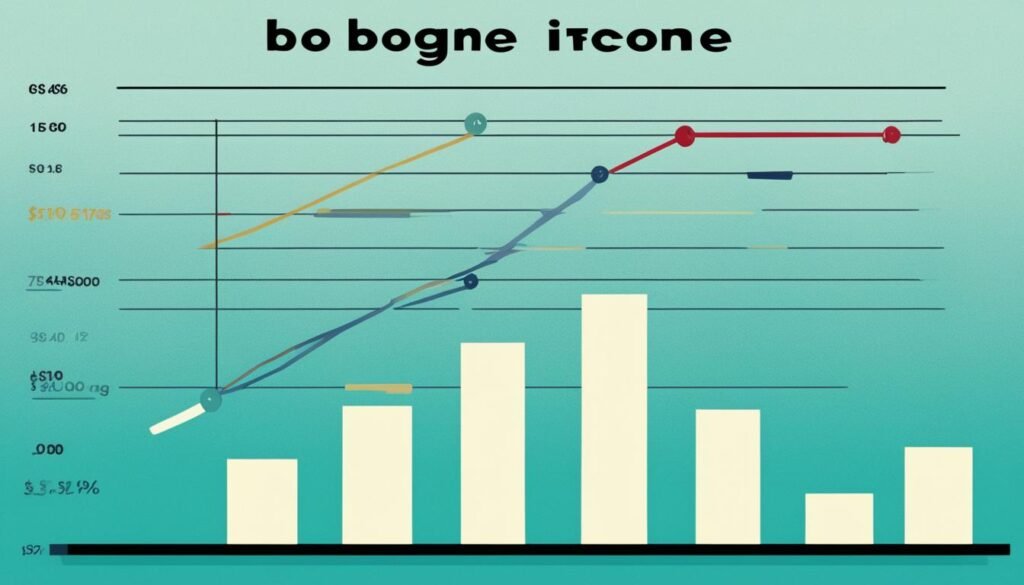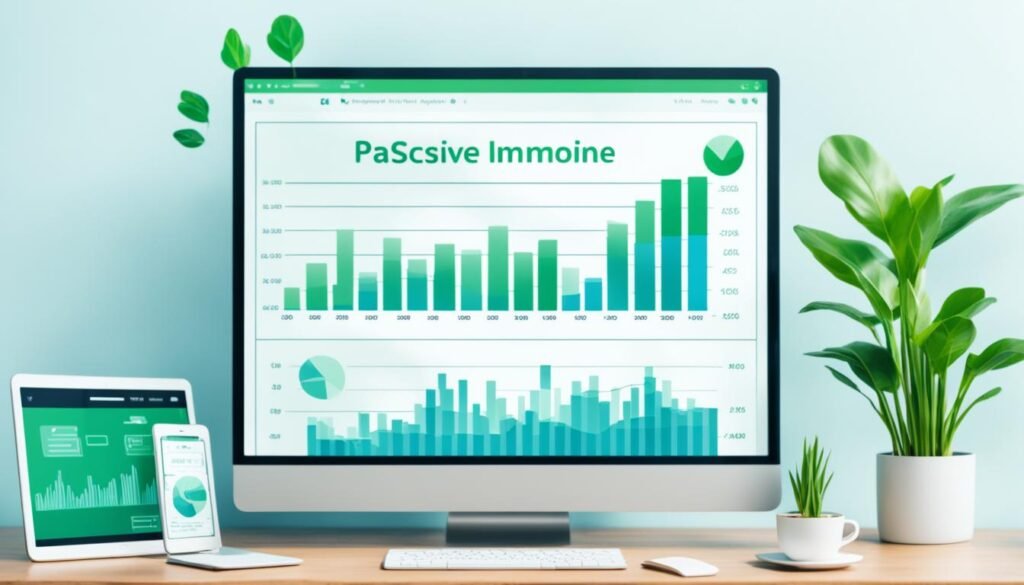Are you looking for ways to boost your income through blogging? With the right strategies and monetization techniques, you can turn your passion for blogging into a profitable venture. Many well-established bloggers have successfully generated thousands of pounds per month from their websites, and you can too.
However, it’s important to understand that the income potential of blogging varies depending on several factors. In this article, we will explore the different strategies you can use to monetize your blog effectively and maximize your earnings.
Table of Contents
ToggleKey Takeaways:
- Choose a profitable niche that aligns with your interests and has clear monetization potential.
- Implement various monetization strategies such as affiliate marketing, ad revenue optimization, sponsored content, and offering products or services.
- Build an email list to engage with your audience and increase your chances of generating sales through email marketing.
- Understand that building a successful and profitable blog takes time, effort, and dedication.
- Keep exploring new ways to improve your blogging revenue and adapt to the evolving landscape of online monetization.
How Much Money Can Bloggers Earn?
The income potential of bloggers varies greatly. Well-established bloggers like Ryan Robinson and Adam Enfroy have earned significant amounts per month from their blogs, but not every blogger can achieve that level of success. The income potential depends on factors like the niche and monetization strategies employed.
Blogging has become a lucrative endeavor for many individuals, offering the opportunity to earn a substantial income from the comfort of their own homes. However, it’s important to understand that the income potential of blogging is not a one-size-fits-all scenario. While some bloggers have managed to generate thousands of dollars per month, others may struggle to earn even a modest income.
One of the key factors that determine bloggers’ earning potential is the niche they choose. Some niches, such as finance and personal development, have a wide audience and higher monetization potential. On the other hand, niches with smaller audiences or limited monetization options may pose challenges in terms of generating significant revenue.
Real-Life Examples of Successful Bloggers
“Ryan Robinson, a renowned blogger in the entrepreneurship and online business niche, has managed to achieve remarkable success through his blog. He reportedly earns over $30,000 per month from various income streams, including affiliate marketing, sponsored content, and the sale of his own products.”
“Similarly, Adam Enfroy, a digital marketing expert and blogger, has built a highly profitable blog in the online marketing niche. He reportedly earns over $80,000 per month from his blog, primarily through affiliate marketing and sponsored content.”
These examples highlight the income potential that can be achieved through blogging. However, it’s important to note that these individuals have invested years of hard work, dedication, and strategic planning into their blogs. Their success is not simply a result of luck, but a combination of consistent effort and effective monetization strategies.
Earning a substantial income from blogging requires a comprehensive approach to monetization. It’s not enough to rely solely on one income stream; successful bloggers diversify their revenue sources to maximize their earnings potential.

| Monetization Strategy | Description |
|---|---|
| Affiliate Marketing | Bloggers earn commissions by promoting products or services and driving sales through unique affiliate links. |
| Ad Revenue Optimization | Bloggers can generate income by displaying advertisements on their websites and optimizing their ad placements for maximum revenue. |
| Creating and Selling Products | Bloggers develop and sell their own digital or physical products, such as ebooks, online courses, or merchandise related to their niche. |
| Sponsored Content | Bloggers collaborate with brands or businesses to create sponsored content, where they promote products or services in exchange for payment. |
| Offering Services | Bloggers can leverage their expertise to offer services such as coaching, consulting, or freelance writing to their audience. |
| Creating a Membership Community | Bloggers can create a membership site or community where they provide exclusive content, resources, or support in exchange for a recurring fee. |
By strategically implementing these monetization strategies, bloggers can increase their income potential and generate substantial revenue from their blogs. However, it’s important to understand that building a profitable blog takes time, effort, and consistency. Bloggers must consistently create high-quality content, engage with their audience, and adapt their strategies based on their niche and audience preferences.
In the next section, we’ll explore the different monetization strategies in more detail, providing you with actionable tips to boost your blogging revenue.
Monetization Strategies for Bloggers
As a blogger, you have numerous opportunities to monetize your website and turn your passion into a source of passive income. By implementing effective monetization strategies, you can maximize your blog’s revenue potential and create a sustainable income stream. Here are some popular strategies that successful bloggers use:
Affiliate Marketing
One of the most popular monetization strategies for bloggers is affiliate marketing. With affiliate marketing, you earn a commission for promoting products or services on your blog. By recommending products that align with your niche and audience’s interests, you can earn passive income through affiliate partnerships. Consider joining affiliate programs like Amazon Associates, ShareASale, or Commission Junction to start earning commissions.
Create and Sell Digital or Physical Products
Another profitable strategy is to create and sell your own digital or physical products. These could include e-books, online courses, merchandise, or even physical products related to your blog’s niche. By leveraging your expertise and providing valuable resources to your audience, you can generate income while also adding value to your readers.
Ad Revenue Optimization
Maximizing ad revenue through strategic ad placement and optimization is another monetization strategy for bloggers. By joining ad networks such as Google AdSense or Mediavine, you can display ads on your blog and earn money based on impressions or clicks. Experiment with different ad formats and placements to find the optimal balance between user experience and revenue generation.
Sponsored Content
Sponsored content involves collaborating with brands or companies to create sponsored blog posts or social media content. By partnering with relevant brands, you can generate income through sponsored content while providing valuable information or recommendations to your audience. However, it’s important to maintain transparency and only promote products or services that align with your blog’s niche and audience’s interests.
Offer Services or Create a Membership Community
If you have specialized skills or knowledge related to your blog’s niche, you can offer services or create a membership community. This could include consulting, coaching, or providing exclusive content, resources, and support to your community members. By leveraging your expertise, you can generate additional income while building a loyal and engaged audience.
Remember, the key to successful monetization is finding the right mix of strategies that align with your blog’s niche and resonate with your audience. Experiment, analyze the results, and adapt your approach to optimize your blog’s revenue potential. By diversifying your income streams and focusing on providing value to your readers, you can create a sustainable and profitable blogging business.

Choosing a Profitable Niche
Choosing a profitable niche is a critical step in your journey to generate revenue through blogging. A profitable niche refers to a specific topic or area that has the potential to attract a large audience and generate substantial income. When selecting a niche, it’s essential to consider several factors that contribute to its profitability.
Criteria for a Profitable Niche
A profitable niche should meet the following criteria:
- Interest and Skill: Choose a niche that aligns with your interests and expertise. When you have passion and knowledge in a particular area, it becomes easier to create valuable content.
- Low Competition: Research the competition within your niche. Selecting a niche with low competition allows you to position yourself as an authority figure and attract a dedicated audience.
- Monetization Potential: Evaluate the monetization potential of your chosen niche. Assess whether there are products, services, or affiliate programs available that can be promoted to generate income.
By considering these criteria, you can make an informed decision when selecting a niche for your blog.
Remember, a profitable niche is a balance between your interests and the potential to generate income. Take your time to research and assess different options before making a final decision.
| Niche | Competition Level | Monetization Potential |
|---|---|---|
| Fitness | High | High |
| Personal Finance | Medium | High |
| Travel | High | Medium |
| Vegan Recipes | Low | Low |
As shown in the table above, different niches present varying levels of competition and monetization potential. Choosing a niche with lower competition and high monetization potential can increase your chances of success.
Once you have selected a profitable niche, it’s time to create high-quality content and implement effective monetization strategies to maximize your blog’s revenue.
Building an Email List
As a blogger, one of the most effective ways to monetize your blog and increase your revenue is by building an email list. Building an email list allows you to establish a direct line of communication with your readers, fostering a strong and loyal community. This, in turn, creates opportunities for email marketing and blog monetization.
By offering enticing incentives to your readers, such as exclusive content, discounts, or freebies, you can encourage them to sign up for your email list. Once they become subscribers, you have a receptive audience that is more likely to engage with your content and, ultimately, make purchases based on your recommendations.
Email marketing is widely recognized as a highly effective sales channel for bloggers. According to a study by Campaign Monitor, for every $1 spent on email marketing, the average return on investment (ROI) is $42. That’s a remarkable potential for generating revenue!
When it comes to email marketing, one of the key factors for success is personalization. Tailoring your emails to your subscribers’ interests and needs can greatly improve engagement and conversions.
Benefits of Building an Email List
Building an email list provides several benefits for bloggers:
- Direct Communication: Sending personalized emails allows you to communicate directly with your readers, nurturing a sense of community and fostering a deeper connection.
- Increased Engagement: Subscribers who willingly provide their email addresses are more likely to be engaged with your blog and its content, leading to higher click-through rates and more conversions.
- Monetization Opportunities: With a targeted email list, you can promote your products, affiliate offers, sponsored content, or even sell ad space to monetize your blog effectively.
- Repeat Visitors: Email marketing keeps your blog fresh in the minds of your subscribers, reminding them to revisit your site and engage with new content.
Remember, building an email list is a long-term strategy that requires consistent effort and dedication. It’s essential to provide value to your subscribers, deliver engaging content, and ensure that your emails are relevant and timely.
Now that you understand the importance of building an email list let’s take a look at some email marketing strategies to help you maximize the potential of your blog monetization.
| Email Marketing Strategies | Description |
|---|---|
| Segmentation | Grouping subscribers based on their interests or behavior allows you to send targeted emails that are more likely to resonate with the recipient. |
| Automation | Automating your email campaigns can save you time and ensure that your subscribers receive timely and relevant content, such as welcome sequences, nurturing series, or abandoned cart reminders. |
| Personalization | Addressing your subscribers by their names and tailoring the content of your emails to their preferences and past interactions helps make the communication more personal and engaging. |
| Call-to-Action (CTA) | Including clear and compelling calls-to-action within your emails encourages your subscribers to take the desired action, such as making a purchase, signing up for a course, or downloading a free ebook. |
| Analytics and Testing | Regularly analyzing the performance of your email campaigns and A/B testing different elements, such as subject lines or email templates, can help you optimize your strategies and improve results over time. |
Implementing these email marketing strategies along with consistently providing valuable content to your subscribers can significantly boost your blog monetization efforts and increase your overall revenue.
Next, we’ll discuss in section 6 how to conclude the article, summarizing the key points discussed and leaving the readers inspired to take action in increasing their blog income.
Conclusion
Blogging is not only a platform to express your passion and share your expertise, but it also has the potential to transform into a profitable venture. By implementing effective monetization strategies, selecting a niche with clear revenue potential, and building a loyal audience, you can increase your blog income and turn your passion into profit.
One of the key blogging revenue tips is to diversify your income streams. Consider affiliate marketing, where you can earn commissions by promoting products relevant to your niche. Creating and selling your own digital or physical products is another avenue to explore. Additionally, optimizing ad revenue, offering sponsored content, and providing services or creating a membership community can contribute to your overall blog income.
However, keep in mind that increasing your blog income requires persistence and dedication. It takes time to build a successful and profitable blog. Be patient and continue to produce high-quality content that resonates with your audience. Engage with your readers, build an email list, and leverage email marketing to nurture relationships and increase conversions.
In summary, turning your passion for blogging into a sustainable income source is possible with the right strategies. Focus on monetization, niche selection, and audience building to maximize your blog’s revenue potential. Remember, achieving financial success through blogging requires continuous effort, adaptation, and a genuine dedication to your craft.





